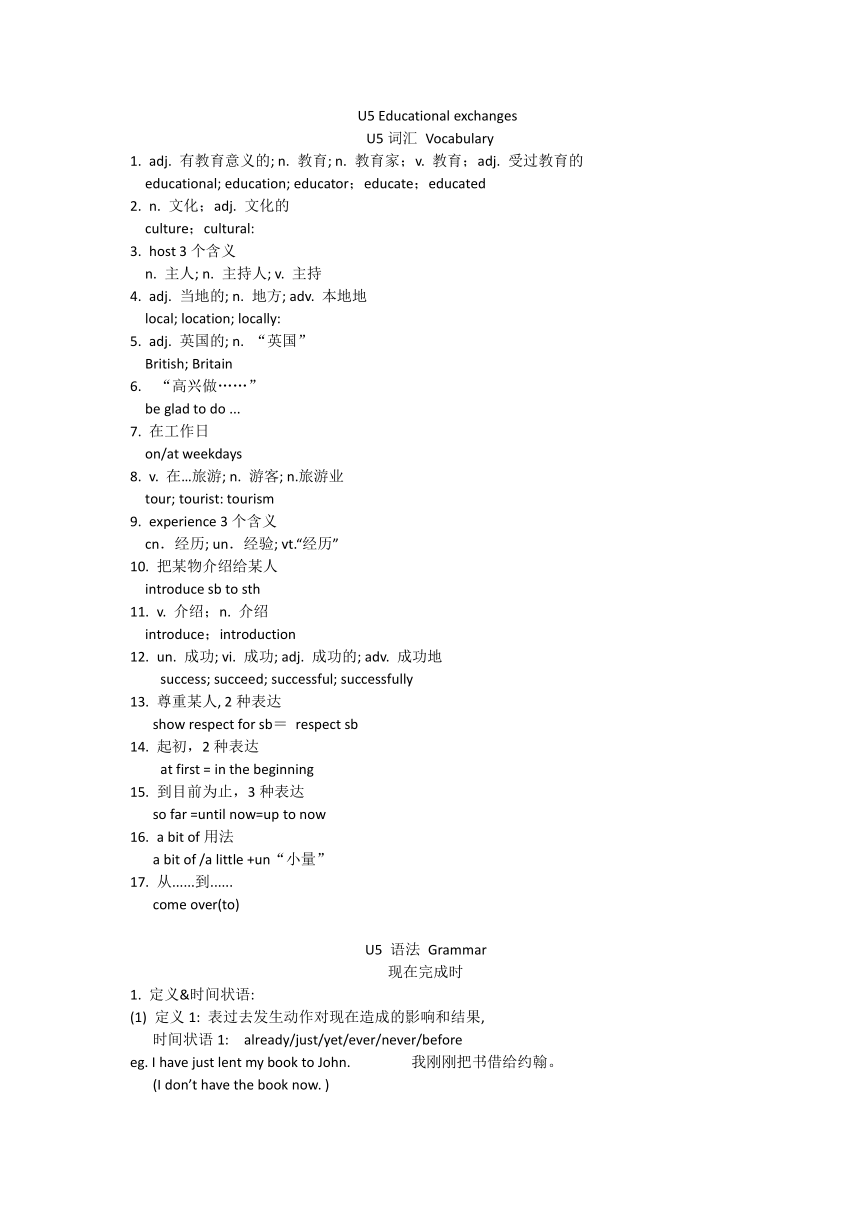
U5 Educational exchanges U5词汇 Vocabulary adj. 有教育意义的; n. 教育; n. 教育家;v. 教育;adj. 受过教育的 educational; education; educator;educate;educated n. 文化;adj. 文化的 culture;cultural: host 3个含义 n. 主人; n. 主持人; v. 主持 adj. 当地的; n. 地方; adv. 本地地 local; location; locally: adj. 英国的; n. “英国” British; Britain “高兴做……” be glad to do ... 在工作日 on/at weekdays v. 在…旅游; n. 游客; n.旅游业 tour; tourist: tourism experience 3个含义 cn.经历; un.经验; vt.“经历” 把某物介绍给某人 introduce sb to sth v. 介绍;n. 介绍 introduce;introduction un. 成功; vi. 成功; adj. 成功的; adv. 成功地 success; succeed; successful; successfully 尊重某人, 2种表达 show respect for sb= respect sb 起初,2种表达 at first = in the beginning 到目前为止,3种表达 so far =until now=up to now a bit of用法 a bit of /a little +un“小量” 从......到...... come over(to) U5 语法 Grammar 现在完成时 1. 定义&时间状语: (1) 定义1: 表过去发生动作对现在造成的影响和结果, 时间状语1: already/just/yet/ever/never/before eg. I have just lent my book to John. 我刚刚把书借给约翰。 (I don’t have the book now. ) ① already: “已经”, 用在肯定句中; 放在have和done中间, 也可放在句末 eg. We have already finished our homework. = We have finished our homework already. 我们已完成家庭作业了。 ② just: “刚刚”, 用在肯定句中; 放在have和done中间 eg. I have just finished lunch. 我刚吃过午饭。 ③ yet: 放在句末 “已经”, 用在疑问句中 eg. Have you finished your homework yet 你完成家庭作业了吗? “还”, 用在否定句中 eg. I haven't made a decision yet. 我还没做决定。 ④ ever: “曾经”, 用于疑问句和肯定句中, 放在have和done中间 eg. I have ever seen this film. 我曾经看过这电影。 Have you ever been to the USA 你去过美国吗? ⑤ never: “从来不”, 用在否定句中, 放在have和done中间 eg. Is he famous I have never heard of him. 他很有名吗?我从来没听说过他。 ⑥ before: “以前”, 放在句尾 eg.Ihave never read this kind of books before. 我之前从没读过这种书。 (2) 定义2: 表过去发生动作一直延续到现在, 还有可能继续下去, 动词用延续性动词 时间状语2: for+段时间, since+点时间, since+ 段时间 + ago, since+句子(过去时) ever since(then) 自从(那以后) eg. Kate has lived here for 3 years. He has stayed here since 5 o’clock. Kate has lived here since 3 years ago. Kate has lived here since she came to China. (She began to live there many years ago, she lives there now and she will go on living there.) 【拓展】其他时间标志: once,twice…/several times (...次); still(仍然); these days/recently/lately(最近); so far/up to now/by now (到目前为止); in the past/last ... years (过去几年来) 【注】若对时间状语划线提问, 可用How long... eg. How long has he learned math 他学习数学学多久了? 常见非延续性动词和延续性动词的转变 直接换为持续性动词: buy →have, borrow →keep, get sth →have sth, become →be 2. 换为be +名词: join the army →be a soldier/be a member of the army go to school →be a student 3. 变为be + 状态的形容词 die →be dead, finish →be over, start/ begin →be on, leave (sp.)→be away (from sp.), clos ... ...
~~ 您好,已阅读到文档的结尾了 ~~

